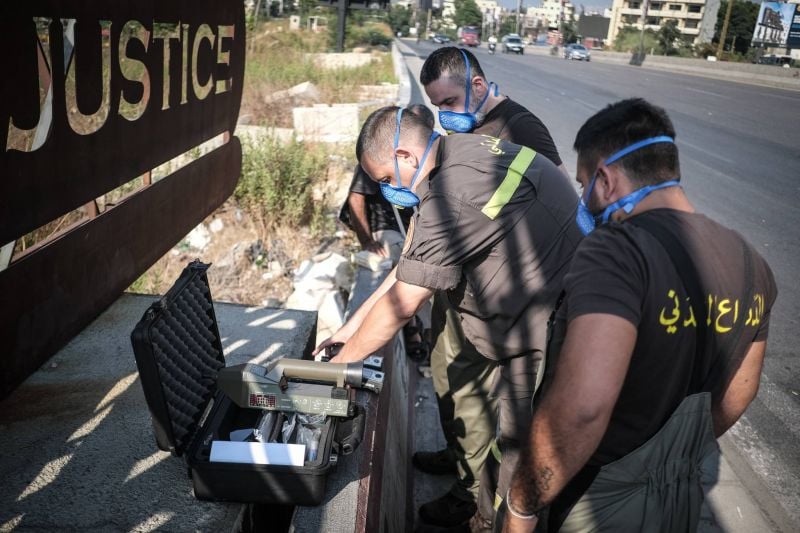
Civil Defense volunteers at the destroyed Beirut port ahead of the second anniversary of its deadly explosion. Aug. 3, 2022. (Credit: João Sousa/L'Orient Today)
BEIRUT — Parliament is set to approve a law on Thursday that would, for the first time, allow 2,100 newly employed Civil Defense volunteers to receive their salary.
With some exceptions, Lebanon’s Civil Defense has long been staffed by unpaid volunteers — that was meant to change in August 2023, when more than 2,100 of them who had been putting out fires and rescuing citizens without pay for years were formally employed and promised salaries.
It was a major expansion in the General Directorate of Civil Defense's paid workforce, which, as of a September 2022 survey by the Civil Service Board, had 589 paid staff.
Since then, however, a legal issue has prevented the transfer of the newly promised salaries. That is because the caretaker Cabinet hadn't decided whether to consider the new employees among the country’s security forces or public employees, who both get different benefits.
To solve this issue, Parliament is expected to vote Thursday on an “urgent” law to categorize the 2,100 Civil Defense staff members as public employees.
MP Bilal Abdallah, a member of Parliament’s Finance and Budget Committee, which wrote the law, told L’Orient Today that the point of the law is to start paying the volunteers their salaries. “They are civilians, not a security force so they should be in that category,” Abdallah added.
“The Civil Defense Directorate does not have the facilities of the security forces. We don’t have health insurance or hospitals for the directorate or procedures for security forces education and other benefits. That’s why they decided to include us as public employees to facilitate these benefits,” Civil Defense spokesperson Elie Khairallah said.
‘We work day and night’
The longtime lack of pay has left the Lebanese public to rely on mostly unpaid rescue workers to face its biggest emergencies.
Charbel Msan, the Civil Defense’s Mount Lebanon regional director and a volunteer since 1998, told L’Orient Today that he has not been paid anything since he started. He was among the 2,100 volunteers selected for formal employment last August.
“We don’t get any money, zero money. Every day I come to the branch and I have some tasks. We work day and night, we don’t have off days, and most of the holidays we’re in the branch,” he said.
“Thank you to our families for putting up with this.”
Forty-five-year-old Msan, who has three children, said he stays at the low-reward, high-risk job to serve his community. According to Msan, most Civil Defense volunteers simply keep side jobs to make enough income to survive. But the economic crisis starting in 2019 made it even harder for volunteers to make ends meet.
“Now we go to the doctor and we tell him we don’t have money,” Msan said.
Should the law pass through Parliament on Thursday, being classified as a public employee would, finally, mean a salary and some benefits for members of the Civil Defense— that is, at the now-decimated Lebanese lira, which has lost much of its value since 2019.
“It is better than nothing — now we get benefits that are worth less than before the crisis. But it is worth something,” Msan said.
He maintains that he’d stay in the job regardless. “A friend of mine who was serving in the security forces in the south called me once to say that his house was on fire and that his wife and two children were stuck [inside],” Msan remembers. “So I went there. His seven-year-old son told me, ‘Please I don’t want to die.’”
“If these words can’t get to me, or [make me] continue to give to the community, then I’m without a heart. This incident and many similar ones keep me going,” he said.